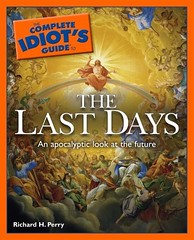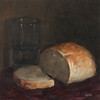Gentle Reader,
With the events of VirginaTech the other day and while we pray for those who lost their lives and those who were left behind to grieve. I am reminded that we live in perilous times. The Bible speaks of "the Last days" and so I want to take a step back and look at what is going on. Do you mind?
Watch out that no one deceives you. For many will come in my name, claiming, 'I am the Christ, ' and will deceive many. You will hear of wars and rumors of wars, but see to it that you are not alarmed. Such things must happen, but the end is still to come. Nation will rise against nation, and kingdom against kingdom. There will be famines and earthquakes in various places. All these are the beginning of birth pains. "Then you will be handed over to be persecuted and put to death, and you will be hated by all nations because of me. At that time many will turn away from the faith and will betray and hate each other, and many false prophets will appear and deceive many people. Because of the increase of wickedness, the love of most will grow cold, but he who stands firm to the end will be saved. And this gospel of the kingdom will be preached in the whole world as a testimony to all nations, and then the end will come. [Matthew 24:4-14]
We will not start where all Bible Scholars do in the book of Matthew in the New testament. But before we do you need to know that I will not take you down the road that has been taken before we are going to take the "Road less traveled" It’s Paul that I refer to when we begin to understand the "Last Days " 2Timothy 3:1 This know also, that in the last days perilous times shall come.
2TI 3:2 For men shall be lovers of their own selves, covetous, boasters, proud, blasphemers, disobedient to parents, unthankful, unholy,
2TI 3:3 Without natural affection, truce breakers, false accusers, incontinent, fierce, despisers of those that are good,
2TI 3:4 Traitors, heady, high-minded, lovers of pleasures more than lovers of God;
2TI 3:5 Having a form of godliness, but denying the power thereof: from such turn away.
2TI 3:6 For of this sort are they which creep into houses, and lead captive silly women laden with sins, led away with divers lusts,
2TI 3:7 Ever learning, and never able to come to the knowledge of the truth.
2TI 3:8 Now as Jannes and Jambres withstood Moses, so do these also resist the truth: men of corrupt minds, reprobate concerning the faith.
Just as the keynote of the balancing member 2 Timothy 2:14 -26 is the word 'approved', dokimos (2 Tim. 2:15), so the keynote of the present section
is 'disapproved' or 'reprobate', adokimos (2 Tim. 3: . The apostle opens this section with a forecast of the character of the last days. We must exercise care when meeting this expression lest we confuse things that differ. Peter quoting from Joel refers to the 'last days', but a reading of the context shows that these days immediately precede 'the great and dreadful day of the Lord' and are associated with Israel's restoration. The Lord speaks of 'the last day' six times in the Gospel according to John, and the day He refers to is the day of resurrection and judgment.
. The apostle opens this section with a forecast of the character of the last days. We must exercise care when meeting this expression lest we confuse things that differ. Peter quoting from Joel refers to the 'last days', but a reading of the context shows that these days immediately precede 'the great and dreadful day of the Lord' and are associated with Israel's restoration. The Lord speaks of 'the last day' six times in the Gospel according to John, and the day He refers to is the day of resurrection and judgment.
From the standpoint of the epistle to the Hebrews, 'these last days' refer to the days of Christ's first Advent (Heb. 1:2), even as John in his first epistle said:
'it is the last time' (2:1 .
.
It is manifest that each writer views the subject from his own point of view, Peter's 'last days' would be the last days of the dispensation associated with the Kingdom and Israel, whereas Paul's 'last days' would be the closing days of the dispensation of the Mystery.
We are concerned when we read in 2 Peter 3:3, that in the last days shall come scoffers who shall walk after their own lusts and deny the Second Coming of the Lord; but we should be still more concerned to learn that the closing days of this most favoured dispensation {GRACE} will end in apostasy parallel to the conditions of ancient paganism (for proof of this statement see later exposition), and characterized by the same dreadful motive 'after their own lusts' (2 Tim. 4:3). With such passages of Scripture written for our learning, and with the consciousness that the end of the present dispensation cannot be far off, the
reader will not be easily moved to believe that a great spiritual revival is on its way, even though such should be 'a consummation devoutly to be wished'.
In the first epistle to Timothy, the apostle had been led to speak of the outstanding character of the 'latter times', husterois kairois, 'latter seasons'. Not only is there the change of word 'days' in 2 Timothy 3 and 'seasons' in 1 Timothy 4, but also the second epistle speaks of the 'last', eschatos, 'the extreme end', whereas 1 Timothy speaks of the period that is 'left over', husteros, of the season. Consequently, the state of affairs described in the first epistle must be understood as leading up to the crisis of the second epistle. The apostasy starts in 1 Timothy 4, for the word depart' is the Greek word aphistemi from which our word 'apostasy' is derived, it marks the beginning of the movement that ends with the awful reprobation of 2 Timothy 3.
This departure from the faith is the outcome of 'giving heed to
seducing spirits and doctrines of demons' which, while including antagonism against the essentials of the Gospel, points markedly to 'spiritism', a cult that is developing with alarming rapidity and captivating millions. While 'seducing spirits' are not named in 2 Timothy 3, their fell* work is to be seen in the word translated 'perilous' times or seasons. This word 'perilous' is the Greek word chalepos, the word employed in Matthew 8:28 to describe two demon -possessed men who lived among tombs, exceeding 'fierce'.
*fell = cruel, fierce, barbarous, savage, or inhuman.
Such is the prophetic picture of the last days of this the one in which we live - [GRACE] dispensation.
The truth forsaken, those who hold it despised or persecuted, the whole dominated by the doctrine of demons; no wonder the apostle spoke of a day
Enough for today Gentle reader, make your eyes bleed? Well I want to set the record straight. So next time you come back you’ll find less people with you reading this blog - from over 2,250 per day to how many I’ll let you know.
"I am just one beggar showing another begar where to find bread"





No comments:
Post a Comment